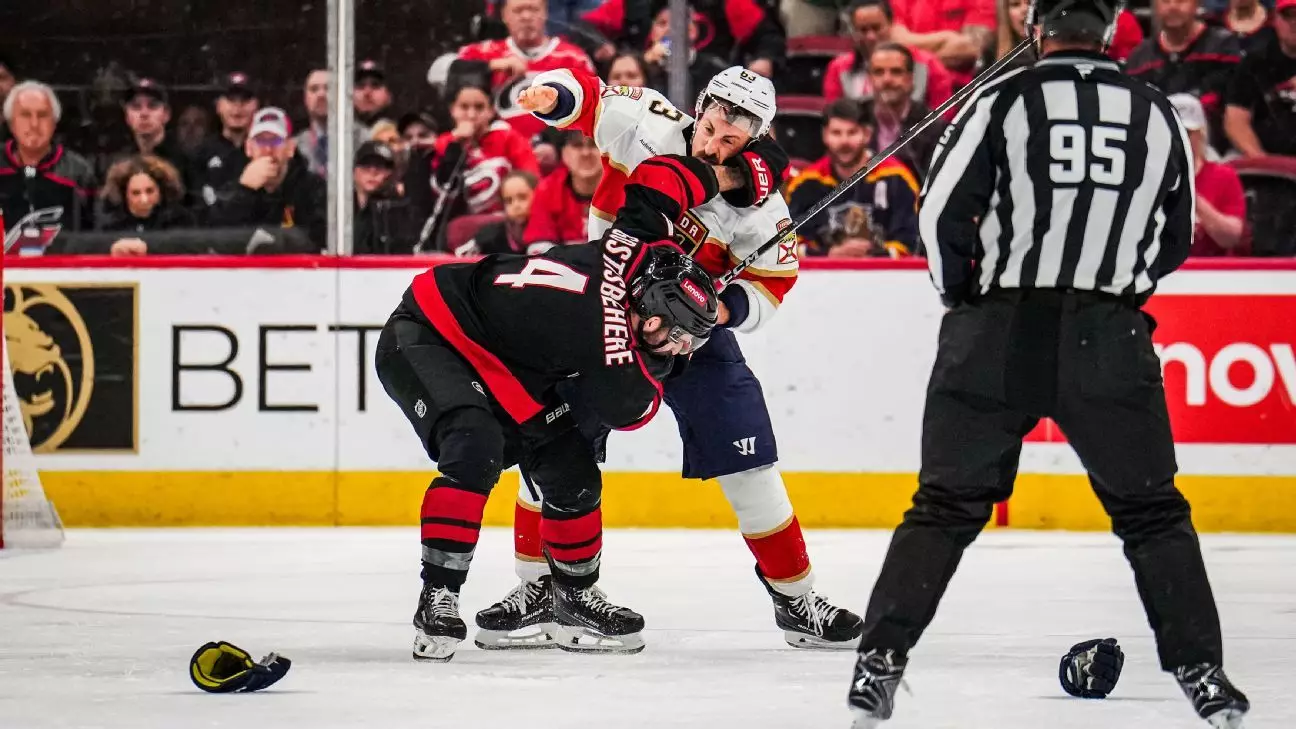The Stanley Cup playoffs are not just a contest of skills; they are a battle of wills, where even the most skilled players can falter under pressure. In the recent Game 1 of the Eastern Conference finals, the Carolina Hurricanes faced the Florida Panthers and went home with a 5-2 loss that could be attributed, in part, to emotional impulses. Coach Rod Brind’Amour highlighted the need for his players to outsmart the opposition, particularly when it comes to responding to the Panthers’ aggressive tactics. It’s a reminder that basketball is as much about mental strength as it is about physical prowess.
In high-stakes scenarios like these, players tend to react based on emotion rather than strategy. Brind’Amour articulated the challenge when he pointed out the detrimental effects of retaliation. Particularly notable was the roughing penalty assessed to Sebastian Aho; instead of maintaining focus on building an offensive strategy, this ill-timed decision handed the Panthers an unexpected edge. The implications of such penalties extend beyond just a moment lost; they can alter the entire trajectory of a game and potentially the series.
The Fallout of Retaliation
Retaliation has been a double-edged sword for the Hurricanes. In a sport as fast-paced as hockey, retaliatory actions often lead to penalties that place a team at a disadvantage. The sentiment echoed by Brind’Amour and Captain Jordan Staal serves as a crucial lesson: mistakes can rapidly be amplified in tense playoff situations. The Hurricanes have a history of performing well when scoring first, boasting a clean 5-0 record in such circumstances. However, it’s crucial to maintain discipline and avoid penalties that could undermine advantageous positions.
The case of Aho’s retaliatory swing at Anton Lundell is not isolated; it underscores a pattern of emotional decisions that might seem justifiable in the heat of the moment but ultimately prove fatal in the long run. The game of hockey often tests the mental fortitude of its players, and Aho’s decision may haunt the Hurricanes as they look to regain control in the series.
Lessons from the Panthers
In contrast, the Panthers exhibit a commendable level of composure that allows them to capitalize on critical mistakes made by their opponents. With a track record that showcases their ability to thrive under pressure—having won the Stanley Cup the previous season—the resilience and strategic discipline of the Panthers could act as a blueprint for the Hurricanes. Their composed handling of on-ice skirmishes showcases a profound understanding of managing both emotions and strategy. Rather than retaliate against the Hurricanes’ aggressive plays, players like goaltender Sergei Bobrovsky remain anchored, focusing on their game even when tensions escalate.
Bobrovsky’s steadfastness serves as an example for his teammates and highlights one of hockey’s fundamental truths: emotional control can define the outcome of a match. In an atmosphere where every puck and play counts, keeping clear-headed allows a team to seize opportunities.
The Need for Strategic Evolution
As the series progresses, it’s crucial for the Hurricanes to recalibrate their approach. The playoff landscape isn’t a painting by numbers; it requires teams to be fluid in their strategies while maintaining an emotional equilibrium. With Game 2 looming, the focus must shift from individual reactions to a collective strategy that prioritizes team dynamics over individual emotions.
The ability to adapt while under constant pressure will undoubtedly be a determining factor in the series. The Hurricanes must develop a proactive stance that ensures they respond to provocations with a tactical mindset rather than allowing an emotional state to govern their actions.
An Unforgiving Arena
The arena of the Stanley Cup playoffs is unrelenting, and each game contributes to an overarching narrative. The story of Game 1 illustrates that while talent and skill are paramount, mental agility and resilience are equally essential. Whether the Hurricanes can overcome their emotional hurdles and curb their impulsive reactions will determine if they can wrest the series back into their favor.
As each game unfolds, it is increasingly clear that the players must not only be skilled athletes but savvy strategists who can read the game’s flow and adapt accordingly. In this high-pressure environment, controlling one’s emotional response to adversity will be as critical as putting the puck in the net.


Leave a Reply